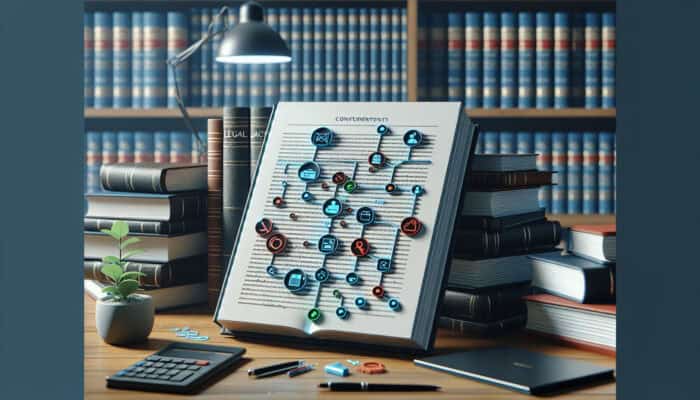Comprehensive Guide to Understanding Non-Disclosure Agreements in Professional Environments
What Is the Definition and Purpose of a Non-Disclosure Agreement?

Non-disclosure agreements, often abbreviated as NDAs, are integral legal contracts designed to secure sensitive information that is shared between two or more parties. These agreements play a pivotal role in ensuring confidentiality and nurturing trust, especially within business contexts where sensitive data is frequently exchanged. By establishing explicit guidelines on how confidential information should be handled, NDAs promote a secure workplace environment. Furthermore, they enhance the credibility of professional interactions, which is essential for fostering long-term business relationships marked by integrity and reliability.
The fundamental components of NDAs typically encompass:
- Definition of Confidential Information: A detailed specification of what qualifies as confidential information.
- Obligations of the Parties: A comprehensive outline of each party’s responsibilities regarding the handling of confidential information.
- Duration of the Agreement: An articulation of the time frame during which the confidentiality obligations remain enforceable.
- Permitted Disclosures: A thorough explanation of circumstances under which confidential information may be disclosed.
- Consequences of Breach: A clear depiction of the penalties or repercussions if either party fails to adhere to the terms outlined in the agreement.
Understanding these essential elements is crucial for anyone engaged in human VA work, as it lays the groundwork for effective and trustworthy professional collaborations.
What Are the Different Types of NDAs Relevant to Virtual Assistant Work?
In the realm of virtual assistant (VA) work, various types of NDAs are utilized, each tailored to address specific confidentiality requirements. These NDAs differ based on the type of information being safeguarded, the relationship dynamics among the involved parties, and the prevailing industry standards.
The primary types of NDAs include:
- Unilateral NDAs: In this format, one party shares information with another, obligating the latter to maintain confidentiality regarding the information received.
- Mutual NDAs: Both parties disclose confidential information and agree to protect each other’s sensitive data.
- Multilateral NDAs: This arrangement involves multiple parties, all of whom consent to uphold confidentiality concerning shared information.
- Employer-Employee NDAs: Frequently employed to protect confidential information exchanged within an employment relationship.
- Client-Contractor NDAs: Commonly used in freelance agreements to ensure the protection of client information shared with independent contractors.
Each type of NDA serves a distinct function and is vital for preserving the integrity of relationships in VA work.
Why Are Non-Disclosure Agreements Vital for Successful VA Relationships?
NDAs are indispensable in safeguarding sensitive information within virtual assistant relationships. Without these agreements, the likelihood of information leaks increases significantly, potentially resulting in severe financial repercussions and reputational harm. The absence of NDAs may foster a chaotic work environment where trust diminishes, causing parties to hesitate in sharing essential information.
The potential ramifications of failing to implement NDAs in VA work can include:
- Loss of Intellectual Property: Without adequate protection, proprietary information is vulnerable to theft by unauthorized parties.
- Decreased Trust: Clients may lose confidence in a VA’s capacity to securely manage sensitive information.
- Legal Consequences: Pursuing legal action following a breach can be challenging without an NDA to support claims.
- Competitive Disadvantage: Sensitive strategies and information may inadvertently be revealed to competitors.
Ultimately, NDAs are essential for cultivating a secure and trustworthy professional atmosphere where both parties feel at ease sharing sensitive information.
What Essential Clauses Should Be Incorporated in NDAs for Virtual Assistants?

When drafting NDAs for virtual assistants, it’s imperative to include specific key clauses that guarantee thorough protection of sensitive information. These clauses explicitly outline each party’s responsibilities and specify the conditions under which confidentiality is upheld.
Key clauses in NDAs for virtual assistants should encompass:
- Confidentiality Clause: A precise definition of what is considered confidential information.
- Non-Use Clause: Prohibits the recipient from utilizing the confidential information for any purposes outside those outlined in the agreement.
- Non-Compete Clause: Prevents the virtual assistant from offering similar services to competitors either during or after the agreement period.
- Return of Information Clause: Details the obligations of each party regarding the return or destruction of confidential information upon the termination of the agreement.
- Dispute Resolution Clause: Establishes a process for addressing any disagreements that may arise from the NDA.
Grasping and integrating these clauses into NDAs is critical for ensuring that all parties are fully aware of their rights and responsibilities.
What Best Practices Should Be Followed to Successfully Implement NDAs?
Effectively implementing NDAs in VA work necessitates adherence to several best practices that foster clarity, understanding, and compliance among all involved parties. Open communication and routine reviews are crucial for maintaining the efficacy of these contracts.
Best practices for NDA implementation encompass:
- Clear Communication: Ensure that all parties thoroughly comprehend the terms and implications of the NDA.
- Regular Reviews: Schedule periodic evaluations of the NDA to confirm its continued relevance and effectiveness.
- Training on Confidentiality: Provide education for all parties regarding the significance of maintaining confidentiality and the explicit obligations outlined in the NDA.
- Legal Consultation: Seek advice from a legal expert when drafting or reviewing NDAs to guarantee compliance with applicable laws.
By adhering to these best practices, both VAs and their clients can cultivate a secure and trustworthy working relationship, ensuring that sensitive information is effectively protected.
What Are the Core Elements of Non-Disclosure Agreements?
What Key Clauses Are Typically Found in NDAs?

A well-structured NDA comprises several essential clauses that delineate the parameters of the agreement and the obligations of the involved parties. These clauses are vital for establishing a clear understanding of what constitutes confidential information and the responsibilities each party is expected to fulfill.
Common NDA clauses generally consist of:
- Definition of Confidential Information: A detailed description of which information is classified as confidential.
- Obligations of the Receiving Party: Specifies the responsibilities of the party receiving the confidential information.
- Duration of Confidentiality: Indicates the length of time the confidentiality obligations will remain effective.
- Permitted Disclosures: Outlines exceptions to the confidentiality agreement.
- Governing Law: Identifies the jurisdiction under which the NDA will be interpreted and enforced.
Incorporating these clauses ensures that the NDA provides a strong framework for confidentiality and the protection of sensitive information, which is crucial in human VA work.
What Steps Are Necessary to Draft a Well-Structured NDA?
Creating an effective NDA requires meticulous consideration and attention to detail to guarantee that it adequately safeguards the interests of both parties. A well-formulated NDA should distinctly define the scope of confidentiality and be enforceable under relevant legal standards.
Best practices for drafting NDAs for VA work include:
- Define Confidentiality Clearly: Specify the types of information that are protected under the NDA.
- Specify the Parties Involved: Clearly identify all parties bound by the agreement.
- Legal Compliance: Ensure that the NDA adheres to local laws and regulations to enhance its enforceability.
- Limit Scope and Duration: Clearly articulate the duration of the NDA and avoid overly broad confidentiality claims.
By following these best practices, you will create an NDA that effectively protects sensitive information while remaining clear and enforceable, providing peace of mind in the VA workspace.
What Factors Influence the Enforceability of Non-Disclosure Agreements?
The enforceability of NDAs is a crucial aspect that ensures the protections they offer can be upheld in a legal setting. Several factors significantly impact the enforceability of an NDA, including the clarity of language, the reasonableness of terms, and adherence to legal standards.
To enhance the likelihood of your NDA being legally enforceable, consider the following:
- Clarity of Terms: Utilize clear and unambiguous language to define all terms related to confidentiality.
- Reasonableness: Ensure that the terms of the NDA are reasonable and not excessively restrictive.
- Legal Compliance: Draft the NDA in accordance with applicable laws to avoid challenges to its validity.
- Signatures of Both Parties: Ensure that the NDA is signed by all involved parties to demonstrate mutual agreement.
By taking these steps, you can significantly bolster the chances of your NDA being enforced, thereby providing security for both parties in VA work.
What Insights Do Experts Share on Non-Disclosure Agreements for Human VA Work?
What Expert Recommendations Are Available for Effective NDA Implementation?
Successfully implementing NDAs in human VA work necessitates an understanding of the unique requirements associated with the role of a virtual assistant. Experts advise a tailored approach that reflects the specific duties of the VA and the nature of the information being shared.
Practical examples of effective NDA implementation include scenarios where virtual assistants manage sensitive client data, proprietary business strategies, or intellectual property. Customizing the NDA to address these specific needs ensures that both the VA and the client feel secure in their professional relationship.
Key expert recommendations for NDA implementation include:
- Customisation: Adjust the NDA to reflect the specific duties and responsibilities of the VA, ensuring all sensitive areas are adequately covered.
- Regular Communication: Maintain open lines of communication concerning confidentiality expectations and any potential changes in information handling.
- Periodic Reviews: Regularly evaluate the NDA to verify its relevance, especially in a fast-changing business environment.
- Seek Feedback: Encourage VAs to provide insights on the NDA, helping to identify areas for improvement.
By incorporating these expert insights, both VAs and their clients can effectively navigate the complexities of confidentiality with confidence.
What Common Mistakes Should Be Avoided When Drafting NDAs?
Although NDAs are crucial for safeguarding sensitive information, certain common mistakes can undermine their effectiveness. Recognizing these pitfalls is essential for individuals involved in VA work to ensure that their agreements remain robust and enforceable.
Frequent mistakes in NDAs consist of:
- Overly Broad Definitions: Vague definitions of confidential information can lead to misunderstandings and diminish enforceability.
- Lack of Specificity: Failing to clearly outline obligations and expectations can create ambiguity and confusion.
- Failure to Update: Neglecting to regularly review and revise NDAs can result in them becoming outdated.
- Ignoring Local Laws: Overlooking jurisdictional differences can adversely affect the enforceability of an NDA.
Avoiding these common errors is vital for maintaining the integrity of the NDA and ensuring that sensitive information remains protected within the VA landscape.
What Best Practices Ensure Compliance with Non-Disclosure Agreements?
Ensuring compliance with NDAs is essential for maintaining the confidentiality of sensitive information shared in VA work. Regular training and clear communication of expectations significantly contribute to fostering a culture of compliance.
Actionable steps for maintaining NDA compliance include:
- Regular Training: Provide ongoing education for VAs regarding the importance of confidentiality and the implications of the NDA.
- Clear Communication: Maintain an open dialogue about confidentiality expectations and any updates to the NDA.
- Monitoring Adherence: Implement mechanisms to track compliance with the NDA and promptly address any breaches.
- Documenting Compliance Efforts: Keep records of training and compliance initiatives to demonstrate a commitment to confidentiality.
By integrating these practices, both VAs and their clients can cultivate a strong culture of compliance that effectively safeguards sensitive information.
What Legal Aspects Should Be Considered for NDAs in VA Work?
Understanding the legal implications of NDAs is essential for anyone involved in human VA work. The enforceability of these agreements depends on their clarity, reasonableness, and adherence to legal standards.
Key legal considerations for NDAs encompass:
- Enforceability: Assess whether the NDA can withstand legal scrutiny based on its terms and clarity.
- Jurisdictional Issues: Be aware of the jurisdiction under which the NDA will be enforced, as laws may vary considerably.
- Potential Disputes: Prepare for possible disputes by including clear dispute resolution mechanisms within the NDA.
- Breach Consequences: Understand the legal options available in the event of a breach, including potential remedies.
By considering these legal factors, both VAs and their clients can establish a more secure framework for managing confidential information.
What Effective Strategies Can Be Used for Negotiating NDAs in Human VA Work?
What Negotiation Techniques Should Be Applied for NDAs?
Successfully negotiating NDAs is vital for reaching an agreement that fulfills the needs of both parties in VA work. Understanding the priorities of each side, remaining flexible, and striving for mutual agreement on terms can substantially enhance the negotiation process.
Key negotiation strategies for NDAs in VA work include:
- Prioritise Key Issues: Concentrate on the most critical elements of the NDA that are significant to both parties.
- Maintain Flexibility: Be open to alternative terms or conditions that may satisfy the needs of both parties.
- Use Clear Language: Ensure that all terms are articulated clearly to prevent misinterpretations.
- Encourage Collaboration: Foster a cooperative environment that promotes both parties to express their concerns and expectations.
By employing these strategies, negotiators can create NDAs that are not only legally sound but also foster a constructive working relationship between virtual assistants and their clients.
How Can NDA Disputes Be Managed Effectively?
Disputes stemming from NDAs can create significant challenges in VA work, necessitating a clear strategy for resolution. Open communication and mediation often play crucial roles in amicably resolving conflicts, although there may be instances where legal intervention is necessary.
To effectively manage NDA disputes, consider the following:
- Open Communication: Foster dialogue between the parties to discuss issues and seek resolution.
- Mediation: If direct communication fails to resolve the situation, consider involving a neutral third party to facilitate a resolution.
- Review the NDA: Refer back to the terms of the NDA to determine the best course of action based on the agreed-upon clauses.
- Legal Intervention: Be prepared to seek legal advice or intervention if disputes cannot be resolved amicably.
By taking these measures, the parties involved can effectively navigate NDA disputes while preserving the integrity of their professional relationship.
How Can Protection and Flexibility Be Balanced in NDAs?
Achieving a suitable balance between protection and flexibility in NDAs is crucial to ensure that both parties feel secure while remaining adaptable to evolving circumstances in VA work. An excessively rigid NDA can impede operational efficiency, while an overly lenient agreement may compromise confidentiality.
Best practices for balancing protection and flexibility in NDAs include:
- Tailored Agreements: Customize the NDA to reflect the specific needs and dynamics of the professional relationship.
- Include Review Clauses: Allow for periodic assessments of the NDA to modify terms as necessary based on changing circumstances.
- Define Scope Clearly: Specify the boundaries of confidentiality while permitting reasonable use of information.
- Encourage Feedback: Create avenues for feedback on the NDA, enabling parties to voice concerns about flexibility and protection.
Striking this balance fosters trust and collaboration between parties while ensuring that sensitive information remains adequately protected.
What Benefits Do NDAs Provide in Human VA Work?
How Do NDAs Safeguard Confidential Information?
One of the most significant advantages of NDAs in VA work is the protection they afford for confidential information. By formalizing confidentiality obligations, NDAs create a secure environment where sensitive data, including client details or proprietary business strategies, can be exchanged without the fear of unauthorized disclosure.
NDAs safeguard confidential information in VA work by:
- Establishing Trust: Clients and VAs can collaborate with the assurance that sensitive information is protected.
- Defining Confidentiality: Clearly articulating what constitutes confidential information minimizes the potential for misunderstandings.
- Providing a Legal Framework: NDAs offer a legal basis for recourse in cases of breaches, thereby enhancing protection for information.
- Encouraging Open Communication: With confidentiality assured, clients are more inclined to share crucial information necessary for effective collaboration.
In summary, NDAs serve as an essential mechanism for ensuring that private information exchanged within the VA framework remains confidential.
In What Ways Do NDAs Foster Trust and Security in Professional Relationships?
By implementing NDAs, virtual assistants and clients can establish a strong foundation of trust and security in their working relationship. This atmosphere of confidence is critical for effective collaboration, especially when sensitive information is involved.
The role of NDAs in promoting trust within VA relationships includes:
- Reassurance: Clients gain peace of mind knowing that their confidential information is secure.
- Professionalism: The presence of an NDA demonstrates a commitment to maintaining a professional working relationship.
- Increased Collaboration: With trust established, both parties are more likely to engage openly and share valuable insights.
- Long-Term Relationships: The security provided by NDAs can lead to more sustainable partnerships, encouraging repeat business and referrals.
Consequently, NDAs not only function as protective instruments but also as trust-building tools that enhance collaboration in VA work.
What Legal Actions Are Available for Breaches of NDAs?
NDAs create a vital legal framework for addressing breaches of confidentiality, which is particularly significant in VA work. If one party violates the terms of the NDA, the other party has established legal recourse that can assist in rectifying the situation and pursuing damages if needed.
The legal options available in the event of an NDA breach in VA work may include:
- Injunctions: Seeking a court order to prevent further disclosure or misuse of confidential information.
- Damages: Pursuing compensation for any financial losses incurred as a result of the breach.
- Rescission of Agreements: Terminating contracts or agreements based on the breach of confidentiality.
- Legal Fees: Seeking reimbursement for legal expenses incurred while enforcing the NDA.
Having a clear legal framework empowers both parties to take necessary actions in the event of a breach, ensuring that sensitive information remains protected.
When Is It Necessary to Update and Renew Non-Disclosure Agreements?
What Circumstances Require an Update of NDAs?
Regularly updating NDAs is essential in VA work to ensure their continued relevance and effectiveness. Changes in the scope of work, the introduction of new parties, or substantial shifts in the business environment necessitate a review and update of existing NDAs.
Optimal moments to update NDAs in VA work include:
- Change in Scope: When the VA’s responsibilities or tasks evolve, the NDA may need to reflect these new conditions.
- New Parties: If additional parties join the working relationship, an update to the NDA may be necessary.
- Changes in Legal Requirements: Updates in laws or regulations affecting confidentiality may necessitate NDA revisions.
- Operational Changes: Significant shifts in business practices or technology can warrant a review of existing NDAs.
By keeping NDAs current, both VAs and their clients can ensure that their agreements effectively safeguard confidential information.
What Steps Are Involved in Renewing NDAs?
Renewing NDAs requires a systematic approach to reviewing and formalizing the updated contract. This process ensures that all parties are aligned regarding their obligations and the management of confidential information.
Steps involved in renewing NDAs for VA work include:
- Review Current Agreement: Analyze the existing NDA to identify areas that require updates or clarification.
- Negotiate New Terms: Discuss necessary changes with all parties to ensure mutual agreement.
- Document Changes: Clearly record all modifications to the NDA to avoid future misunderstandings.
- Formalize the Agreement: Have all parties sign the updated NDA to validate the renewed agreement.
By following these steps, you can ensure that the NDA remains relevant and enforceable, adapting to the evolving needs of VA work.
Why Is It Important to Conduct Regular Reviews of NDAs?
Conducting regular reviews of NDAs is vital for ensuring their ongoing relevance and effectiveness in protecting confidential information within VA work. These evaluations allow for necessary adjustments based on changes in the working relationship or external factors.
The significance of regular reviews of NDAs in VA work includes:
- Adaptation to Changes: Regular assessments ensure that the NDA reflects any changes in the nature of the work or business environment.
- Preventing Ambiguity: Periodic evaluations help clarify any vague terms that could lead to misunderstandings.
- Maintaining Legal Compliance: Ongoing reviews ensure that the NDA remains compliant with current laws and regulations.
- Reinforcing Commitment: Regular reviews underline the importance of confidentiality, reminding all parties of their obligations.
By prioritizing regular reviews, both VAs and their clients can maintain a solid framework for confidentiality that adapts to their changing needs.
What Key Elements Should Be Incorporated in Updated NDAs?
When updating NDAs, it is crucial to ensure that certain key elements are included for comprehensive protection. These elements should reflect the evolving nature of the working relationship and any changes in the business context.
Key elements to include in updated NDAs for VA work are:
- Clear Definitions: Ensure that all terms, especially regarding confidentiality, are explicitly defined in the updated document.
- Scope of Confidentiality: Clearly outline what information must be kept confidential and under what circumstances.
- Duration of Agreement: Specify how long the updated NDA will remain in effect to ensure clarity.
- Obligations of All Parties: Clearly articulate the responsibilities of each party regarding the handling of confidential information.
Including these elements in updated NDAs helps ensure robust protection as the dynamics of VA work evolve.
What Reliable Strategies Can Be Employed for Non-Disclosure Agreements in Human VA Work?
How to Customize NDAs to Address Specific Needs?
Customizing NDAs to the specific requirements of VA work is vital for ensuring that all relevant aspects of confidentiality are thoroughly addressed. Tailored NDAs take into account the unique nature of the virtual assistant’s role and the specific information they will manage.
Expert insights on customizing NDAs for various VA roles include:
- Role-Specific Considerations: Adapt the NDA to reflect the specific duties, responsibilities, and types of confidential information associated with each VA role.
- Industry Standards: Incorporate industry best practices and standards to inform the NDA’s terms and conditions.
- Feedback from VAs: Engage VAs in the NDA drafting process to ensure alignment with their understanding of confidentiality obligations.
- Flexibility in Terms: Allow for adaptability in the NDA to accommodate changes in the VA’s workload or type of work performed.
By customizing NDAs to meet specific needs, both VAs and their clients can establish a more effective and secure working relationship.
What Training and Education Are Essential Regarding NDAs?
Providing training and education on NDAs is critical for equipping virtual assistants with the knowledge of their obligations and the importance of confidentiality. A well-informed VA is more likely to adhere to the terms of the NDA and uphold professional integrity.
Effective training methods for VAs concerning NDAs include:
- Workshops and Seminars: Organize sessions focused on the importance of NDAs and best practices for maintaining confidentiality.
- Accessible Resources: Provide easy access to NDA templates and educational materials for reference.
- Interactive Training: Utilize case studies and role-playing scenarios to demonstrate the implications of breaches and the significance of confidentiality.
- Regular Updates: Offer ongoing training to keep VAs informed about changes in laws or best practices affecting NDAs.
By implementing these training methods, both VAs and their clients can foster a strong understanding of confidentiality obligations, enhancing the protection of sensitive information.
How to Ensure Effective Monitoring and Enforcement of NDAs?
Effective monitoring and enforcement of NDAs are vital for maintaining confidentiality and ensuring compliance within VA work. Establishing oversight mechanisms helps guarantee that all parties fulfill their obligations under the agreement.
Methods to monitor and enforce NDAs in VA work include:
- Regular Check-Ins: Schedule periodic meetings to discuss confidentiality expectations and any potential issues.
- Feedback Mechanisms: Create channels for VAs to express concerns or challenges they may encounter regarding confidentiality.
- Documentation of Compliance: Keep records of training sessions and adherence efforts to demonstrate commitment to confidentiality.
- Immediate Action on Breaches: Establish a clear protocol for addressing breaches promptly to mitigate potential damages.
By incorporating these monitoring strategies, both VAs and their clients can effectively protect sensitive information and promote a trusting working relationship.
Frequently Asked Questions
What Is a Non-Disclosure Agreement (NDA) and Its Purpose?
A Non-Disclosure Agreement (NDA) is a legal contract that ensures the confidentiality of sensitive information exchanged between parties.
Why Are NDAs Important in VA Work?
NDAs are crucial in VA work as they protect sensitive information, enhance trust, and provide legal recourse in case of breaches.
What Are the Main Types of NDAs?
The main types of NDAs are unilateral, mutual, and multilateral agreements, each designed for specific confidentiality needs.
How Can I Ensure My NDA Is Legally Enforceable?
Ensure clarity in terms, adhere to legal standards, and obtain signatures from all involved parties to strengthen enforceability.
When Should I Consider Updating My NDA?
Update your NDA when there are changes in scope, new parties involved, or significant shifts in the business environment.
What Common Mistakes Should Be Avoided in NDAs?
Common mistakes include overly broad definitions, lack of specificity, and failure to update agreements when necessary.
What Are the Key Clauses to Include in an NDA?
Key clauses typically include confidentiality terms, obligations of parties, duration of confidentiality, and permitted disclosures.
How Should I Provide Training to My VA on NDAs?
Training can include workshops, easily accessible resources, interactive scenarios, and ongoing updates on best practices.
What Are the Consequences of Breaching an NDA?
Consequences may involve legal action, financial damages, and a loss of trust within the professional relationship.
How Can I Monitor Compliance With My NDA?
Monitor compliance through regular check-ins, feedback mechanisms, documentation of compliance efforts, and immediate action on breaches.
Explore our YouTube channel for more insights!
The Article Non-Disclosure Agreements for Human VA Work: Essential Guide First Published On: https://vagods.co.uk
The Article Essential Guide to Non-Disclosure Agreements for Human VAs Was Found On https://limitsofstrategy.com


